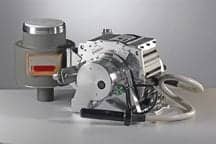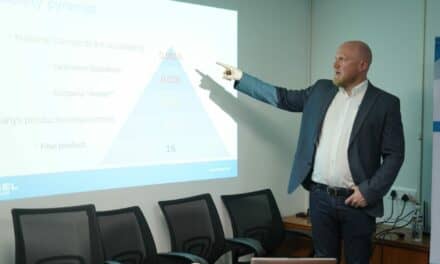By Joie N. Marhefka, PhD
As an educator, I have made a career of teaching, learning, and guiding students through the learning process. Therefore, continuing to pursue knowledge throughout my career and life is quite important to me. But no matter which occupation you choose, I believe that it is vital to keep learning throughout your career. Nowhere does this ring truer than in healthcare technology management (HTM), where advances in medical equipment and other technologies make lifelong learning imperative.
Unlike many other fields, no certification is required to work in HTM. Although some employers encourage certified biomedical equipment technician (CBET) certification, it is certainly not mandatory. I believe, however, that certification offers a number of benefits that make it worthwhile to anyone working in HTM. Perhaps the most obvious benefit is that some employers will pay more if an employee is certified—although this is not a general rule. Another motivating factor for certification? It looks good on a resume.
Standing Out from the Crowd
Having CBET certification (or other relevant certification) on your resume will help you stand out from your peers and may even help you land a job over another candidate. (It certainly can’t hurt!) After all, achieving certification shows your employer and/or perspective employer that you have met a certain set of standards, have specific knowledge, and are dedicated to your work. It also shows your employer that you are committed to continuing education—another benefit of being certified.
Moreover, maintaining CBET and other certifications in the HTM field requires the completion and documentation of continuing education units (CEUs). And achieving CEUs tells current and future employers, as well as other stakeholders, that the certified BMET is actively pursuing leadership roles, teaching or attending courses (both formal and informal), remaining current in industry literature, and partaking in other professional development activities.
In its certification handbook, ACI states that the goals for recertification are “to ensure that ACI-certified professionals remain current with best practices, broaden their understanding of the industry, and continue to be recognized as the leading providers of healthcare technology management.” These are undoubtedly attractive qualities for any employee.
To illustrate my point, I contacted one of our graduates from Penn State New Kensington, Jack Dellostritto, who recently took and passed the CBET exam, and asked him why he chose to pursue certification. Dellostritto’s answer? He wanted to get CBET certified “to both challenge and better prepare [him] for the biomed field,” adding that “the exam was a great motivator to learn and improve on different aspects/skills of the field, including radiology, which is an area of the field that I am interested in.”
Plus, he said: “Both studying and [taking] the exam have helped hone my biomed skills —troubleshooting, critical thinking, problem solving, etc.— and I would highly [encourage] any biomed, present or future, to challenge themselves to go after this certification.” CBET certification isn’t Dellostritto’s only goal, however. His long-term objective is to eventually complete the certified radiology equipment specialist (CRES) exam, as well—“not because I have to per say—but just to chase after the next challenge.”
Along with CBET, other certifications, such as CRES or certified laboratory equipment specialist (CLES), provide comparable benefits for BMETs who have chosen to specialize in certain areas such as imaging or laboratory equipment. BMETs interested in the information technology (IT) side of things, for instance, might consider Cisco Certified Network Associate (CNNA) certification to show competence in networking and IT.
This certification is likely to help BMETs navigate the challenges involved with device integration and prepare them to work in the growing biomed/IT field. Regardless of the acronym, however, all of these certifications show motivation, competence, and commitment to learning and growing an HTM career.
Setting Yourself Up for Success
In addition to certification, additional formal education—often leading to a higher degree— can be beneficial for BMETs, especially those who are interested in going into management. Although many BMET positions do not require formal education beyond an associate’s degree, positions managing BMETs often do. Beyond that, earning a bachelor’s (or higher) degree is an opportunity to learn and demonstrate proficiency in a particular area. For example, earning a degree in IT would benefit the BMET who works on (or is interested in working on) networking and medical equipment integration.
Further, a degree in business, management, or a similar field is likely to benefit BMETs who are interested in managing an HTM department. And an engineering degree may be attractive to BMETs looking to advance their technical skills and potentially get involved in project management, device design, or a related area.
Obtaining a bachelor’s degree (or higher) may open doors to more career paths, as well. It may lead to opportunities in supervisory roles, project management, research and development (R&D), and other areas within HTM. Regardless of your particular focus or ultimate career goals, perusing advanced education requires continuous learning and demonstrates motivation, commitment, and willingness to learn new skills to both employers and customers.
I recently asked two new graduates of our program, who decided to pursue bachelor’s degrees, why they chose to further their education. Matt Reczynski, who is currently pursuing a bachelor’s degree in materials science, said: “I wanted to get back into school after the BMET program because I wanted to work in R&D for a [major] biomedical manufacturer. I had a background in materials engineering before I joined the program so I figured finishing what I started would benefit me a lot. Having actual biomed experience when applying for these more advanced jobs can really make me stand out in the application process. [After all,] who doesn’t like experience?”
Samantha Muhhuku, who recently completed a bachelor’s degree in electrical engineering technology, had similar motivation, saying: “I decided to get a bachelor’s degree because I was interested in more than just the repair and maintenance of medical equipment, which the associate’s degree prepared us for. I was interested in possibly getting into the design and manufacturing of medical equipment. I figured a background in both electrical and biomedical engineering technology would help me get into that industry.”
Maybe your career goals are different than Reczynski’s and Muhhuku’s. Even so, combining formal education with experience will help bolster your skills and your resume, making you an attractive candidate and setting you up for long-term job success.
Less formal education also presents a great opportunity for anyone working in HTM. Attending educational sessions at conferences, participating in webinars, and reading technical articles are less formal ways to keep up with the changing landscape of HTM. Another way to learn technical skills: Attending a manufacturer’s service school, which allows BMETs to work on specific devices.
Finally, joining committees and holding leadership positions in HTM, as well as simply working as a BMET, also contribute to informal education. Of course, many of these pursuits also count as CEUs for maintaining CBET certification. Regardless of one’s motivation, however, these activities allow BMETs to refresh their skills and learn about new developments in the field throughout their careers.
In conclusion, lifelong learning is essential for success in HTM. The field is quickly evolving, so keeping up with the latest technologies and developments is a must. Although this education can be obtained formally or informally, pursuing certification and/or an advanced degree provides a means and a motivation for continued learning and shows employers, customers, and other stakeholders your competence and commitment to lifelong learning. It also helps you achieve a personal sense of accomplishment. For all these reasons, I highly encourage anyone working in HTM to maximize their career by attaining certification and/or an advanced degree.
Joie N. Marhefka, PhD, is assistant teaching professor and biomedical engineering technology program coordinator at Penn State New Kensington in Western Pennsylvania. Questions and comments can be directed to 24×7 Magazine chief editor Keri Forsythe-Stephens at [email protected]






Great article!
Thanks!
Hi Keri/Joie,
What are the prospects of getting a CHTM certification from AAMI and or getting a master’s degree in IT as a Biomed professional?
Kindly advise.
Thanks,
Syed
Unfortunately I am not sure about the CHTM prospects. I think getting a masters in IT is a great idea – but it really depends on your background (undergrad education, etc.) how easy it would be.
Many, many technician’s have a 2 year degree. The field offers no path to progress to certification beyond AAMI because of the 2 year degree. After 40 years in the field I was fairly capable of holding a technical conversation with a Bachelor’s or Master’s degree engineer. As the young tech begins his career s/he is likely starting a family. My question is can the ABSOLUTE REQUIREMENT for a Bachelor’s or Master’s degree be eliminated to enable those dedicated professionals the opportunity to progress up the ladder. Unless, of course, the intent is one of exclusion, which I seriously doubt. I encourage comments.
Are there any reputable on-line courses to move from a Bio-Medical AAS to a bachelor’s degree? Any for HTM as of now?
one of the credentials BMETs should get is the FCC technician class radio operators license. we all need to understand and work with radio frequency equipment, telemetry equipment and wireless monitors and sensors etc… the tech class fcc license will help you prepare for the CBET exam’s electronics section and give you a valuable credential as well, it costs $15 to take the test and renews every 10 years.
see: http://www.arrl.org/getting-your-technician-license for more info…
Thanks for the recommendation!